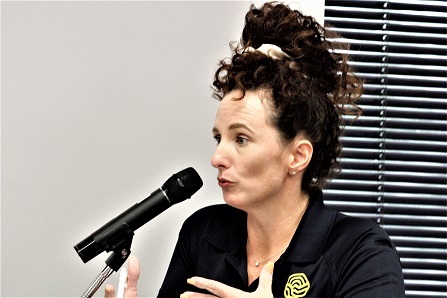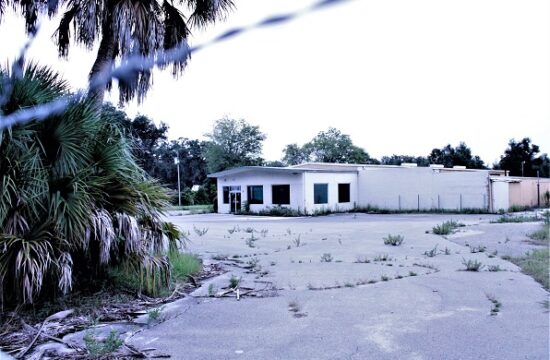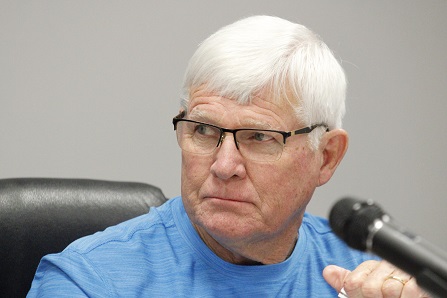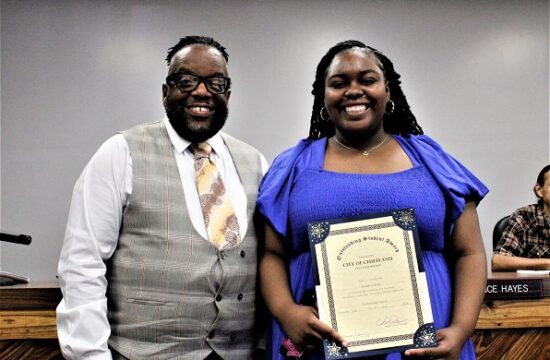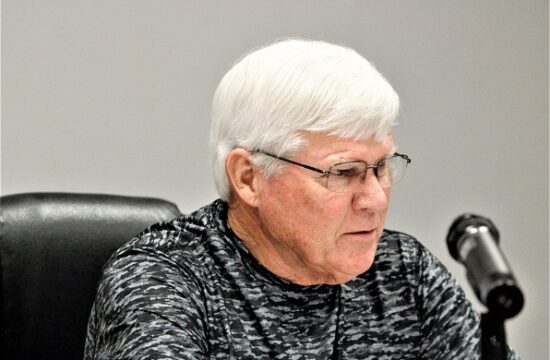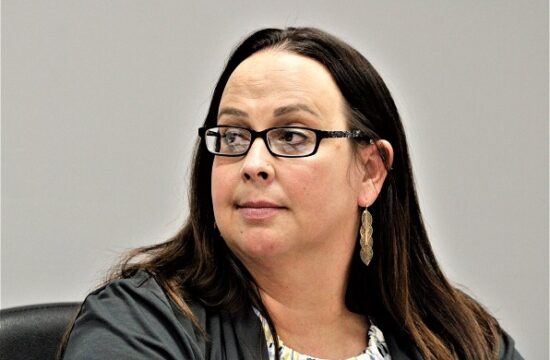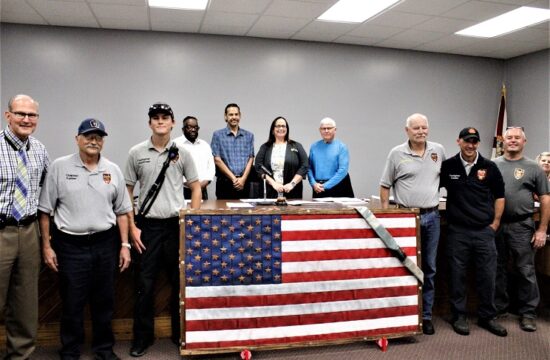By Terry Witt – Spotlight Senior Reporter
Chiefland Mayor Chris Jones invited two Suwannee River Water Management District officials to Monday’s city commission meeting to answer questions about how the city could go about the process of selling water to neighboring cities to generate revenue.
The city currently pumps its water from two water wells inside the city limits and owns a reserve well on 33 acres north of town. While selling water to a neighboring city is possible, Jones is the only Chiefland City Commissioner thus far who has embraced the idea.
Chiefland wouldn’t be the first city to sell bulk water through a pipeline to a neighboring community. Fanning Springs currently sells bulk water to Old Town on the north side of the Suwannee River. A pipe was constructed by the Nature Coast Regional Water Supply Authority to carry water from Fanning Springs to Old Town.
Old Town has a problem with arsenic contamination in its water. Fanning Springs contracted to provide drinking water to Old Town through a pipeline built across the Suwannee River to the Dixie County community. SRWMD made the arrangements to build the pipeline. Fanning Springs sells the water.
Suwannee River Water Management District Deputy Executive Director Tim Alexander attended Monday’s Chiefland City Commission meeting with SRWMD Chief Engineer Leroy Marshall, at the request of Jones, to answer questions about whether Chiefland could sell water from its reserve well north of the city to neighboring communities. Alexander had met with Jones several months ago concerning the possibility of Chiefland selling water from its wellfield protection area north of the city to neighboring towns. The wellfield protection area has a well that isn’t equipped to pump water at this point.
“I know it’s laid dormant and there’s been a lot of discussion about how that may be used,” said Alexander. “As the future comes there are a lot of projects and possibilities to capitalize out there.”
City Commissioner Norman Weaver asked Alexander what Chiefland would be required to do to sell water from the wellhead north of the city to a neighboring community. How would the city get started?
Alexander said he sat on the Nature Coast Water Supply Authority board at one time and there was a lot of discussion and misunderstanding about how authority works. He said the water supply authority owns the pipeline that provides water from Fanning Springs to Old Town. Fanning Springs supplies the water, sets the rates, and does the billing. The authority assesses “a small surcharge” for the use of its pipeline.
Alexander said the water management district owns 122 acres adjoining the 33 acres Chiefland owns on the north side which is the site of its reserve water well. He said it may be beneficial for the city to consider working with the district on possibly selling water to neighboring communities.
“I do think it may be beneficial for you to look at some point for us to try to facilitate it,” Alexander said.
Weaver asked Alexander if the city pumped water from its wellhead north of town to another city, “Can we cut it off if we want to cut it off?”
“If all of a sudden we have an issue and we want to stop supplying that water, can we cut it off?” Weaver said.
“I would say that would depend,” Alexander responded.
“Depend on what?” Weaver said. “That’s the conundrum we’re talking about. Do we have control of the water really?”
“Everybody knows that water is a resource of the state,” said Alexander. “Our responsibility is to permit that water use based on beneficial use, public interest, and protecting those that already have that water use in place. When I say depends, I think that is something you look at before you ever go into any type of mutual agreement. You make sure those things are structured out because not only would you want the ability to cut something off, but you also want to look at the redundancy in case you were to have a failure, could that be reversed and piped in and make sure your citizens maintain the services they needed.”
Weaver asked if Chiefland would be responsible for building a water pipeline to the city that received its water.
“I am not here to represent Nature Coast Water Supply Authority. We would have to invite them to the table. I can tell you currently Fanning Springs does supply water to the citizens of Dixie County. They do the billing, they set the rate. They’re the ones that cut that water off if people don’t pay their bill and they maintain that portion of the lines. There is a service charge that is billed to customers outside their regular service area so that it helps pay the small cost to the regional water authority,” Alexander said. “Outside of that, there are other funding opportunities. This would be strictly for you as the City of Chiefland. There are several opportunities if you wish to expand your water system, update your water system, update your treatment system that we can help you facilitate that as well.”
Leroy Marshall, chief professional engineer for SRWMD, said the district has established a conceptual portal to accept proposals or ideas for water projects. He said the district takes those ideas for projects and works with the applicants to get the project to a point where it can be funded through other grants. He said it doesn’t have to be a complete project and it doesn’t have to be shovel-ready. The district will assist in developing the funding application until it is ready to be submitted.
“We created this portal so we will have projects ready and when the grants become available, we’ll take the projects, however many there are, and we’ll apply and hopefully we’ll see more money in this area,” Marshall said.
City Attorney Norm Fugate cautioned the city commission to be careful about entering a contract to sell water to other cities without knowing the city’s obligations.
“We don’t want to get down the road and it’s costing us a lot of money, we’re losing all our water, we have no control of our water. We don’t want to get into that situation. What really are the obligations when we start pumping water?” Fugate said.
Marshall said he believes when the parties sit down to negotiate and discuss all the issues they can come to some type of agreement with the city.
Jones said the questions being raised can be answered when attorneys for both sides meet to discuss the contract.
Fugate said every one of the questions asked at the city commission meeting Monday night he will respond to on behalf of the board.
“I will be handling that on behalf of whatever this commission says that they want or don’t. I don’t know if there are any magic questions that’s being asked tonight. If you want to be in control of how much water this city sells to another entity, you put in the contract. If you want to be in control to pull that amount back at some point, put it in the contract. If you want to be in charge of changing that rate, you need to put it in the contract and the other side may or may not take that contract. That will be subject to negotiating a contract at some point in time,” Fugate said.
Jones said his main goal is to protect the citizens of Chiefland. If there comes a time when there’s a shortage of water, “obviously I want our citizens to be the first if it was an emergency.” He said his main goal is to use the wellhead north of Chiefland to bring in revenue for the city.
Jones said he hasn’t ruled out using the wellhead for selling bottled water commercially to generate revenue for the city, but he would prefer to sell water to neighboring cities that need water.
“I think a city should serve its purpose; if we can offer water to our neighbor and cities that are in need, I’d like to see the revenue come in that way by helping our neighbor more so than a commercial gain from that standpoint. That’s where I stand on it,” Jones said.
The wellhead property north of Chiefland is the city’s only reserve water supply if either of the wells in Chiefland should fail.
The recently formed Waccasassa Water and Wastewater Cooperative is working on an agreement to provide water and sewer services and reclaimed water to Bronson, Otter Creek, Sumner, and Cedar Key. Chiefland wouldn’t be providing water to those communities.
Fanning Springs currently sells water to Old Town through the Nature Coast Water Supply Authority.
Trenton is part of Gilchrist County, which has nine natural springs. Bell is located in northern Gilchrist County.
During the extended drought that lasted from 1998 through the early part of 2004, Chiefland and neighboring communities were asked by SRWMD to reduce their water usage.
When tropical storms roared through the tri-county area in 2004, heavy rains replenished the Floridan Aquifer and drought-related water consumption restrictions were lifted by SRWMD. Rivers that had shrunk in size during the drought returned to normal volumes.
None of the current city commissioners were members of the Chiefland City Commission during the drought.
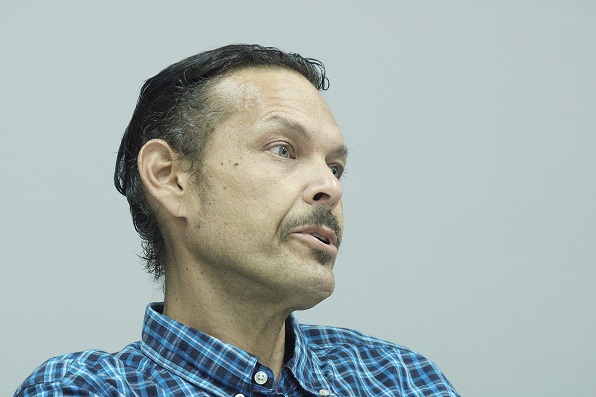
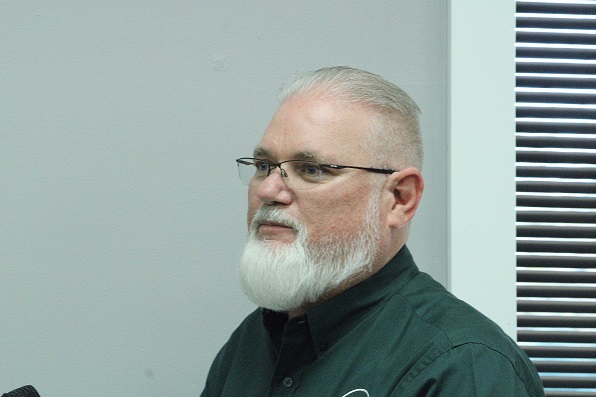
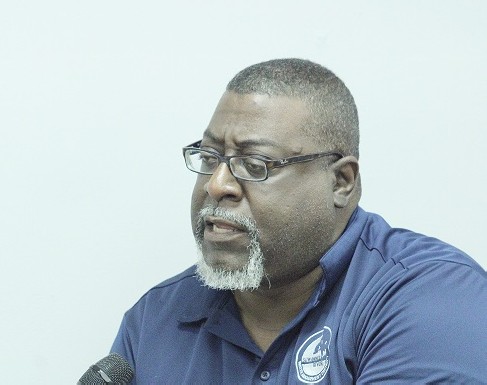
—————————-
City of Chiefland Regular Meeting October 10, 2022; Posted October 12, 2022





